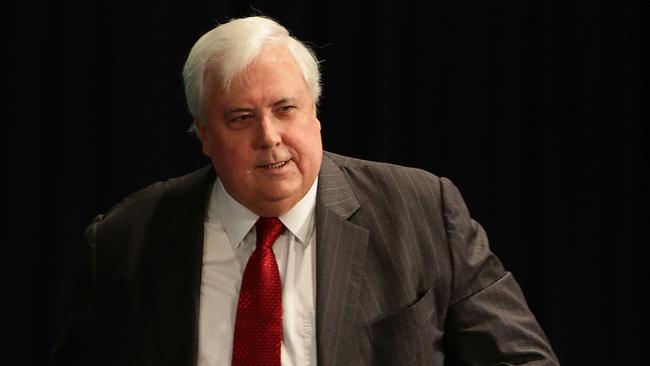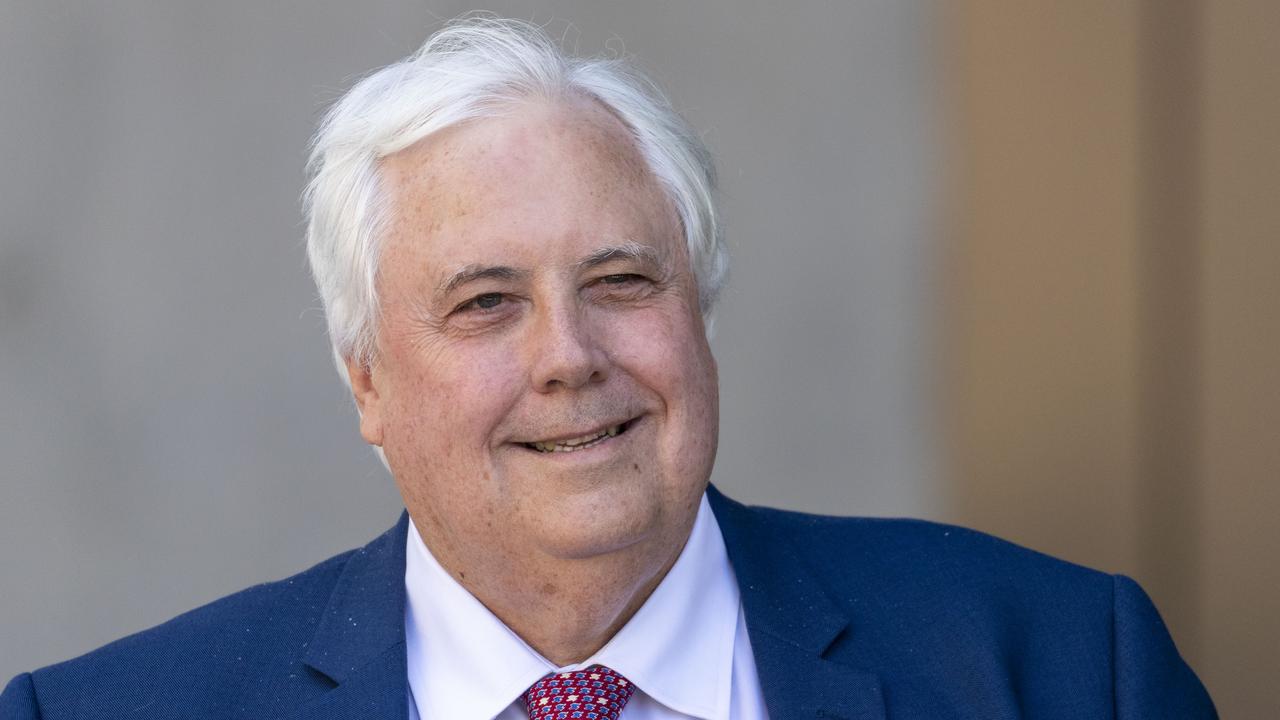Clive Palmer’s ‘false’ plan for port
CLIVE Palmer’s Mineralogy is accused of submitting a security plan with false claims about a new port.

CLIVE Palmer’s flagship resources company is accused of submitting a secret security plan with false claims that misled the federal government about a new Australian port that could be vulnerable to terrorism.
Among the allegations against Mr Palmer’s Mineralogy is that it falsely claimed to be operating the port at Cape Preston — a key hub for exporting billions of dollars wort of iron ore in Western Australia’s Pilbara region — when it was actually run by its Chinese partners.
The claims come amid a deepening rift between Mr Palmer and the giant Chinese company Citic Pacific, which has accused Mineralogy of siphoning millions of dollars from an account set up to fund administration of the port.
New documents filed by senior public servants show the federal Department of Infrastructure found such “fundamental factual inaccuracies and omissions” in Mineralogy’s plans for the port that security would have been compromised at the facility.
The department concluded that the allegedly false claims in Mineralogy’s Maritime Security Plan — part of its strategy to control the port — meant it was “not likely to properly or appropriately contribute towards reducing the vulnerability to terrorist attack of the port or to reducing the risk that the facilities at the port are used to facilitate terrorist or other unlawful activities”. Strict rules and legislation are in place to ensure that every Maritime Security Plan for a port in Australia “sets out the security measures and procedures to be implemented at each maritime security level, to safeguard against acts of unlawful interference with maritime transport or offshore facilities”. As part of a top-level strategy to defend ports from terrorist attacks and other threats, the plans must include a security assessment, security measures at each security level, and other confidential details.
Details of the allegedly false and misleading claims in Mineralogy’s plan now comprise part of an ongoing Federal Court case that reveals for the first time why the department wants to ensure the politician’s company cannot be permitted to play such a vital role at the port. The revelations are in affidavit documents sworn 13 days ago and are now included in Mineralogy’s legal battle to try to regain control of the port at Cape Preston, which is west of Karratha in the northwest of Western Australia.
The evidence shows that Pauline Sullivan, a delegate to the secretary for the Department of Infrastructure, lost confidence in Mineralogy’s competence to have a responsible security-related role at the port because of the company’s “failure to accurately reflect the factual circumstances”.
The Federal Court heard that in a “core conclusion’’ earlier this month, Ms Sullivan found: “I consider that where a (Maritime Security Plan) does not align with and does not accurately reflect the factual circumstances at the port to which it relates in a significant way, the capacity of that (plan) to contribute towards the Maritime Security Act comes as compromised.”
Mineralogy also was accused of having misled the federal government by asserting that the company was already “operating the port facilities” while Citic Pacific held only a minor role. But when officers of the Department of Infrastructure went to the site in Western Australia, they found the opposite of Mineralogy’s claims to be true.
Ms Sullivan determined that “as a matter of fact, (Citic Pacific) operates this port facility”. “The site visit report noted that no Mineralogy health, safety, environmental, security or other operational personnel were observed at the port,” she said.
She added: “Despite these factual circumstances of the port, throughout the Maritime Security Plan submitted by Mineralogy it is suggested, contrary to the fact, that Mineralogy operates much of this infrastructure. This is also reflected in the security risk assessment.”
Citic Pacific lawyer Andrew Bell SC has told the Federal Court in a separate, related case that a “searching inquiry” and “forensic accounting exercise” was needed to trace how more than $12 million of Citic’s money, meant for port maintenance and operations, was allegedly spent by Mineralogy on expenses including electioneering for the Palmer United Party. The matter is likely to be referred to police.
“When Mineralogy has not been (at the port at Cape Preston), how could they have legitimately incurred and expended around $20m in respect to administration costs?” Dr Bell said.
Asked if Mineralogy misled the federal government over port security, Mr Palmer said: “No.” He sent a text: “Keep our profile out there, we just keep moving up the polls the more u (sic) write. Page 1 colour photo.”
The concerns of the Department of Infrastructure about Mineralogy’s claims were disclosed in affidavits before Federal Court judge Steven Rares, who said Citic Pacific and Mineralogy had been “having fights … over a long period of time”.
Mineralogy wants to reverse the department’s decision blocking the company from having control at the port, which will see off iron ore extracted from tenements controlled by the tycoon.
Mineralogy has filed Freedom of Information requests seeking all documents relating to the department’s decision, while the company’s lawyer, Paul Mendelow, told Justice Rares: “Fundamentally, what we’re seeking is the file of the (decision-maker).”
The Infrastructure Department last year reversed its initial position, made on January 31, 2013, that Mineralogy would be “the port operator for the security regulated port of Cape Preston”.
The reasons for the department’s about-face are at the centre of the material before Justice Rares, who three months ago found in favour of Mineralogy following its challenge of the department’s position.
The finding is the subject of an appeal that is yet to be heard.
Citic Pacific built and funded the port and has been operating it for the purpose of iron ore exports, which began late last year. The company, which has not paid royalties to Mr Palmer’s company because of another unresolved dispute, has raised concerns over Mineralogy’s ability to operate the port.
Foreign Minister Julie Bishop last night declined to comment on the case but noted the “worrying allegations”.




To join the conversation, please log in. Don't have an account? Register
Join the conversation, you are commenting as Logout